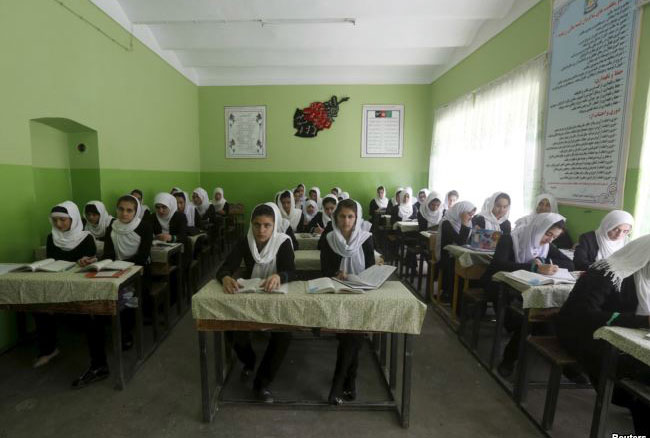Though education is one of the most fundamental factors in socio-economic development but the condition of educational system in Afghanistan is getting more critical as day passes. According to a recent survey carried out by Justice Foundation, the situation of education has been worsening in last three years. This survey conducted with 450 interviewees including teachers, students and community leaders then 87% of them expressed that condition of education has been deteriorating since dawn of NUG (national unity government). Based on this study, 2000 female students poisoned and 1300 schools had been closed. Now, with nearly 65 percent of illiteracy, the country retains one of the highest illiteracy rates in the world; while every year two hundred thousand illiterates are augmented to the current level but our educational system is unable to educate more than 1% out of 10 million currently uneducated people. Generally, there are 16000 schools across Afghanistan but 8,000 schools are still required to be constructed for the remaining 3 million deprived children.
The key chain factors are lack of security, poor management, corruption, unprofessional teachers, discrimination, retreating international donors and non-quality books. The statistics show that 170,000 teachers are currently working to educate over 8 million students. Among this small number of teachers, only 24 percent are legally qualified for coaching, meaning that they completed two years of educational training after high school. In certain areas, the shortage of instructors is so severe that schools are employing teachers that have only passed sixth or seventh grade despite the fact that this is illegal. The university graduated talents are not willing to join schools either due to low salary or variety of corruptions. In some areas, teachers must bribe to get salary or wait for three to six months so that they can get their salary. Furthermore, the number of female school instructors representing are just 30 percent of teachers nationwide. Afghan girls face many obstacles when it comes to their education, including early marriage, conflicts and inaccessibility to nearby schools. As a result, only 9.2 percent of girls reach secondary school, compared to 28 percent of boys.
In addition, there are many other issues such as old shaky school buildings, outdoor schools overcrowding, which mean that sometimes multiple students must share a desk or up to ten students must share a textbook whereas the ministry of education fails to spend his allocated budget. Most schools have resorted to operating on split shifts wherein students only receive three hours of instruction each day. Child labor has also been a serious issue in Afghanistan, and it has hindered many children from receiving an education. It is said that approximately one quarter of children ages 7 - 14 were working in recent years, with higher numbers occurring in more rural areas. Child labor makes it much more difficult for many to attend school, while it keeps some from education completely. Students who are enrolled often fail to attend school on a regular basis due to outside obstacles like early marriage, child labor and most importantly security issues.
Similarly, educational system is undermined by corruption as It is said that there are still many ghost schools receiving funds while there is no staff or students, or the number of staff and students are fabricated. Taking bribe, discriminations and sexual abuse are the other forms of corruptions which widely exist in educational system. These issues highly bring the last decade achievements of Afghanistan’s education sector under question. The existing challenges to the education sector underline the need for the national unity government to take actions in addressing the challenges in the sector.
Overall, Afghanistan is still one of the countries where many school-age children have no access to schooling or day to day they are losing their motives due to ruling psychological war and unemployed graduates. It is obvious when children are not in school or have no motivation for school, they are at an increased danger of abuse, exploitation, and recruitment into armed groups. Conflict and fragile security impedes delivery of school supplies, enrolment, monitoring and school supervision these challenges are exacerbated by entrenched tribal norms that oppose the education of girls. Early marriage also often interrupts the education of such girls as may have been fortunate enough to have entered school. In recent years, two hundred and sixty thousand girls have been refrained from schooling, while the trend is increasing especially for senior classes.
In conclusion, we need to use from modern experiences available in today’s world if there is a decisive will to rescue this nation. For example, In Japan, education is one the top national priority that attract the highest amount of national budget. the prestige of the teaching profession elementary teachers ranked 9th and 18th in public esteem, out of 82 occupations and monthly they get average 7500$. Elementary teachers enjoyed higher prestige than civil and mechanical engineers, and municipal department heads. Thus, Principals' prestige is higher than that of department heads of large corporations, public accountants, and authors. University professors were ranked third, below court judges and presidents of large companies, but above physicians. the Competition for becoming a formal teacher continues to be intense; for instance, there are around 200,000 applicants annually for approximately 38,000 vacancies in Japan public school system. And legally, education is compulsory at elementary and lower secondary levels. As a result, now Japan is one of great economy power and ranked as a highest quality education with Zero illiteracy in the World!
Home » Opinion » Dose of Solution to Challenges of Educational System
Dose of Solution to Challenges of Educational System
| Mohammad Zahir Akbari

